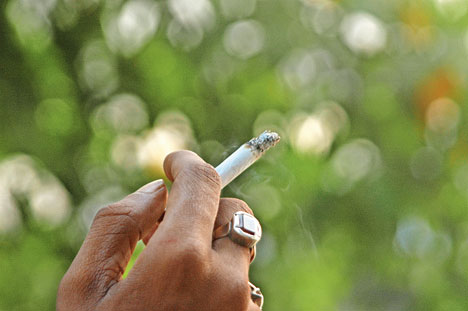
Shillong: Meghalaya tops the list of tobacco use by children at 96.4 per cent as well as the use of heroin at 27.3 per cent in the country.
This was revealed by Dr W. Kharshiing, managing director, Woodland Institute of Nursing, at its first national conference held here.
The conference, on the theme Substance, Suicide and Adolescents: Effects of Substance Abuse and Suicide in Adolescents, was organised by the institute in collaboration with St Anthony's College and was sponsored by chief minister Conrad Sangma's Youth Development Scheme.
Kharshiing said a survey conducted by the health and family welfare ministry in 2012 revealed that 28.6 per cent boys aged between 15 and 19 used tobacco while 15 per cent were addicted to alcohol.
According to the survey, among girls aged between 15 and 19, 5.5 per cent used tobacco while four per cent were addicted to alcohol.
"Tobacco use by children is the highest in Meghalaya at 96.4 per cent followed by Nagaland at 95.8 per cent and Sikkim at 93.1 per cent. In Uttarakhand, 90 per cent children are addicted to tobacco. In Goa only 36.7 per cent consume tobacco while in Delhi 69.7 per cent consume tobacco," Kharshiing said.
Use of heroin was also seen to be the highest in Meghalaya at 27.3 per cent followed by Punjab at 19.3 per cent, he said.
"Injectable drugs, the statistics showed, are popular among children with 88.6 per cent taking it in Mizoram, followed by Meghalaya and Rajasthan at 25 per cent. In Maharashtra, this number is 23.5 per cent, in Punjab it is 13 per cent and in Arunachal Pradesh, Manipur and Madhya Pradesh it is 11 per cent," he said, adding that in other states, the percentage is below seven.
Speaking as the chief guest, Conrad said, "We can sense how urgent and important this issue is to our state and especially to the youths of our nation. It is harming us and our society in ways we cannot even imagine."
He stressed the need to take up policy measures and create awareness among the youths to avoid a situation which might be irreversible. He called for cooperation from the health sector, politicians, society and academicians.
Stating that the future of the country will depend on how the youths' energy is channelised, Conrad said, "If we look at the issue of substance abuse and suicide, this has got the capacity to really channelise the energy in all the wrong ways and if this were to happen, I think the country is already finished before it even starts."
"There must be a support system to ensure that whenever a challenge emerges, there is always a system that guides them (youths) in the right path," he said.
Pointing out at the rise in drug-related issues in the state and the region becoming a gateway for transportations of various kinds of drugs, Conrad said, "We know these challenges are there, and, therefore, simply having policies to block these things and having checks and measures will not be enough. Awareness among and sensitisation of the youths are equally important."
Expressing concern that the state, especially the health department, does not lay much emphasis on stress and psychiatry, he said, "We do not have many policies or facilities. If we look at the public health centres, community health centres and hospitals, we do not have enough psychiatrists or counselling programmes for the youths."
He said, "I think it is important from a government's perspective that counselling centres and clinics are looked into. These will be helpful for us to work and definitely we will discuss this."










